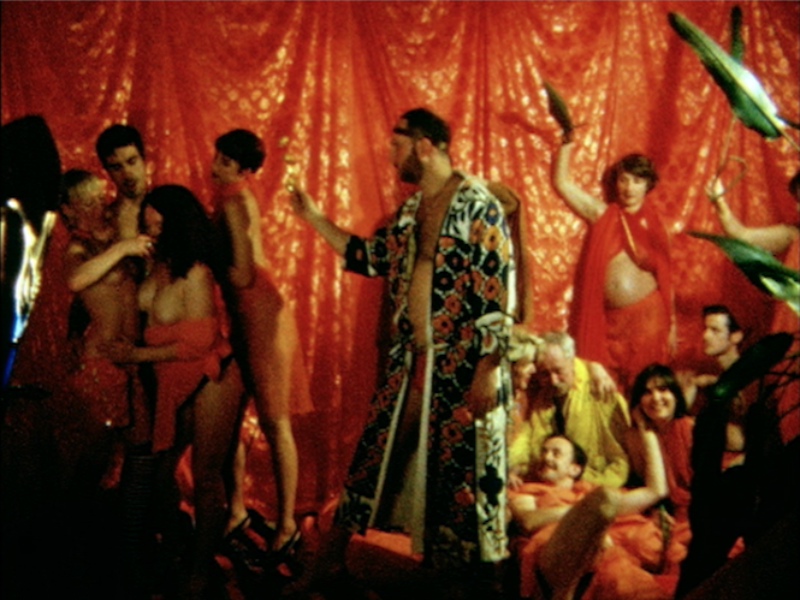Hated Sexuality and Pinochet Porn
Georgia Horgan writes about the work of the late Ellen Cantor and this uncompromising artist’s take on the role of the ‘straight’ woman.

Pinochet Porn was artist Ellen Cantor’s most ambitious project. Based on a series of drawings titled Circus Lives from Hell, this feature-length film tells the coming-of-age stories of five kids against the backdrop of Pinochet’s dictatorship in Chile. Blending autobiography and allegory in dreamy Super 8, the film creates a history of the world as it was known to Cantor. [1] She described Pinochet Porn as “a soap opera” [2] — however, reducing this epic work down to TV seems to hardly to do it justice. Pinochet Porn is a work with a thousand possible entry points or readings, each with their own nuances and complexities. Tragic, comic, fictional, historical, transgressive, subversive and sexual — in many ways, Pinochet Porn defies distillation.
However, an essay generally demands an angle. My friend and I were sitting in the kitchen, drinking gin, and discussing whether or not Pinochet Porn was a queer film. We decided quickly that it was a lazy read. Sure, the rich Super 8 footage recalls many of the classics of queer experimental cinema — think Jack Smith, Derek Jarman etc. There’s a part where someone in a high-femme halter top bites off this guy’s dick, which is totally gleeful, one of my favourite bits. There’re also a few arty BJ shots from an issue of COCK magazine that’s passed around at a party where some friends are doing pills.

Perhaps I am merely replicating the lazy observations I claim to indict. Aside from these aesthetic tropes, Pinochet Porn is the product of a remarkable spirit of collaboration. The film, completed after Cantor’s death in 2013, is not the result of an individual’s vision — no matter how beautiful and compelling — but the work of many. As Cantor describes in a text she wrote for MAP Magazine in 2009, she’d given up on love as her muse and was turning to her friends. Discarding romantic fantasies in favour of a chosen family, it is these intimate collaborations that arguably make Pinochet Porn a queer work.
Nonetheless, to my eye, it lacks the utopian spirit of much of the aforementioned queer cinema it appears to reference. Whereas the DIY decadence of a film like Normal Love points towards an alternative existence outside of compulsory heterosexuality, Pinochet Porn feels substantially less optimistic — melancholic even. As the images of friends, lovers, babies, explosions, corpses and clowns whirl on hazy film stock, the story culminates with a description of a relationship with a man that starts hot and fizzles out. In the final minutes, Cantor asks the question: “Is tragedy a choice?”
Straight Film
If Pinochet Porn isn’t a queer film, then what is it? A straight film, whatever the fuck that is? Surely ‘straight film’ is just mainstream cinema — which Pinochet Porn most certainly is not. Moreover, according to friends of the late artist, Cantor had relationships with both men and women. However, to me, it’s undeniable that straight relationships and straight sex make up the major motif of the film’s two-hour run. For a couple of weeks prior, my preoccupation with the straight angle on Cantor’s most important work was getting in the way of my ability to organise my thoughts. It felt like discussing the work from this subject position, or to explain why I felt a very particular female-hetero experience permeates the work, would be reductive — nihilistic even.
Over our clear cocktails, my friend and I began to speculate if there was anything productive or radical to be extrapolated out of an artist or director’s heterosexual experience. Could this reading have the potential to antagonise, or even deepen a queer reading of the film? At this point, my friend made a wager; they waved their hands and with great conviction said, “Straight women are the most hated sexuality.” They began to elaborate, sticking out their right thumb:
“Straight men hate you.”
They stuck out their right index finger and and pointed to the tip with their left.
“Lesbians hate you.”
Next the middle.
“Trans folks hate you.”
Now the fourth.
“Gay men reserve their own very special kind of hatred.”
They said this with raised eyebrows. We’d been talking about Ariana Grande earlier, so I assumed this was an oblique reference to some of the abusive tendencies of her stans. Finally, the little finger goes up and with a definitive jab on the tip, they said:
“Lastly, other straight women hate you, and you hate yourself.”
Their closing statement was emphasised with a shrug and a hard look in the eyes, as if to say, “suck it up, sweetie”. It made a lot of sense really, particularly the self-loathing part. Although Cantor’s film may ask, “Is tragedy a choice?”, sexuality most certainly is not — as is demonstrated by the continued existence of straight women into 2019. However, this notion of ‘hated sexuality’ helped to identify that Pinochet Porn is, to me, primarily about how institutional power permeates personal relationships — particularly between genders. This interplay of the public and private, romance and tragedy, absolute horror and deep love cuts through the film and makes Cantor’s use of straight sex affecting, vulnerable and radical.

Suck It Harder
For instance, take the film’s most literally pornographic scene, which features the dictator and his maid. In brief, the sequence involves Ellen Cantor in a hokey sexy maid outfit sucking off Wooster Group actor Jim Fletcher, who’s dressed up as General Pinochet. Throughout the scene, his only lines are encuentras el pico (“get the dick”, or literally, “find the beak”, which is a Chilean colloquialism), sí putita (“yes little slut”), chuparlo más fuerte (“suck it harder”) and sigue limpiando (“keep cleaning”). Later in the sequence, Fletcher is sprawled on the floor dipping a wooden spatula between Cantor’s thighs, tasting her pussy like hot soup.
The scene oscillates from a real turn on to pure shit, much like a lot of mainstream straight porn. Moreover, the encounter between the dictator and his maid draws a hard line to the irrevocable link between sex and power: that is, everything is about sex, except sex which is about power. As Jim Fletcher speaks his only substantial line, Cantor is spread over the kitchen counter dusting. “I’ll teach you to be subordinate,” he whispers, and gives her an open-handed slap on the arse. It’s a clear gesture towards the everyday fascism of our relationships, served with a distinct aftertaste of arousal and self-loathing.
However, Cantor’s female characters are never so straightforwardly disempowered — which is part of what makes her output profoundly feminist. For instance, in her MAP article, Cantor explains the dictator’s spatula was a gift from an ex-boyfriend, a symbol of their abortive domestic bliss. Amusingly, Cantor remarks that the use of this loaded object helped her realise that revenge is a dish best served cold. Equally, her portrayal of General Pinochet’s fictional twin daughters Paloma and Pipa reveal the girls as more than spoilt army brats. Their characters are tragic, romantic, and multi-faceted — and despite their connection to “the great master of war”, quite loveable.

This tendency is perhaps more clearly illustrated by how the twins are depicted in the Circus Lives from Hell drawings. Drawn in fairy princess dresses with big doe eyes, the girls are archetypal Disney princesses. In an interview, Cantor’s close friend and collaborator Jonathan Berger explains her complex relationships to these fairytale figures. Her approach to them isn’t critical in the straightforward sense but instead of discarding them, she “gave them dimension… for her that was a powerful, feminist practise.” [3] To give a further example, Ellen’s 1996 series of drawings of a nude Snow White aren’t derogatory — the princess’s sexuality is dealt with with love and reverence.
Light in the Snow
However, Cantor never seeks to gloss over the extreme violence of the structures that produce and police Disney princess subjects. This is demonstrated with uncompromising affect as the story moves from the twins fictionalised love lives to the real, material horrors of the Pinochet regime — many of which were tacitly enabled by the US government. During the dictatorship, approximately 3,065 leftists and other political dissidents were murdered. [4] Tens of thousands more were brutally tortured, with particular emphasis on sexual violence for female captives. One of these women was Luz de las Nieves Ayress, a graduate student from Santiago.
Luz was arrested at the age of 25 and held at the National Soccer Stadium for four years, where she was subjected to unimaginable torture. Guards electrocuted her, beat her, raped her with sticks and bottles, and slashed her flesh. Most horrifying of all, Pinochet’s men trained Doberman and Boxer dogs to sexually assault female prisoners. During her time at the camp, Luz became pregnant. In what seems to be the ultimate symbol of Pinochet’s fascist-patriarchal-theocratic regime, a doctor would be on standby at interrogations to check the heartbeat of the foetus. If all was well, he would give the signal for the torture to continue. However, during these orgies of unspeakable cruelty, it was never clear what they wanted to know.
Luz de las Nieves Ayress survived the detention camps and gave her testimony in 1998. [5] In Pinochet Porn, her entire account is read in full over found footage of Pepsi cola ads from the 80s. We may already know these images of athletic, white couples sipping soda by swimming pools to be latently fascist, but Cantor assures us that they are. On September 12, 1970, Pepsi’s CEO made an urgent call to his former lawyer, President Richard Nixon. He expressed his deep concern about the election of Marxist Salvador Allende in Chile, considering the scope of American investment in the country. From that day, the CIA set to work undermining his government, which ultimately led to Pinochet’s coup. Amidst the images of Pepsi cola served ice cold, Luz de las Nieves Ayress’ broken, tortured, miscarrying body becomes the conduit for the violence of patriarchal capital.

Love and Rage
Throughout the film, the penetrable female body appears as a stand-in for how institutional power infiltrates relationships — crudely demonstrated by the dictator and the maid’s corny roleplay. However, Cantor’s female characters are never merely a channel for a political statement, they are complex subjects with their own agency. Through this treatment, Cantor consistently acknowledges the synthesis of love, loathing, sex and power that moves across relationships of every kind. The effect is profoundly sincere, caring, and almost absolving. That said, the film also retains a potent indignation, vividly illustrating the violence these dynamics produce.
This notion of the straight woman as a ‘hated sexuality’ becomes a useful tool through which to navigate the complexity of Pinochet Porn: you know it’s bad for you, but you want it anyway — like the sugar in Pepsi or sex with someone that hurts you. Instead of drawing definitive lines between experience and emotion, the film weaves fiction, history, violence, sex, anger, joy and despair. It is perhaps this ability to complicate readings that is Pinochet Porn’s most arresting achievement. Cantor and her collaborators handle these stories with loving care, brutal honesty and powerful rage — which is what makes Pinochet Porn such an important work.
[1] ‘A history of the world as it is known to me’, is the subtitle of the Circus Lives from Hell series
[2] Ellen Cantor, Pinochet Porn in Progress, MAP Magazine no.19 (2009)
[3] Jonathan Berger, Scene Stealer, Artforum, vol. 55 no. 2 (2016)
[4] Gideon Long, Chile recognises 9,800 more victims of Pinochet’s rule, BBC News, 18 August, 2011
[5] Joyce Wadler, PUBLIC LIVES; Years After Torture, a Cry Against Pinochet, The New York Times,3 February, 1999
Georgia Horgan is an artist based in Glasgow.
Pinochet Porn screened as MAP’s contribution to the Glasgow Film Festival, Crossing the Line strand, Friday 22 February in CCA Cinema.
